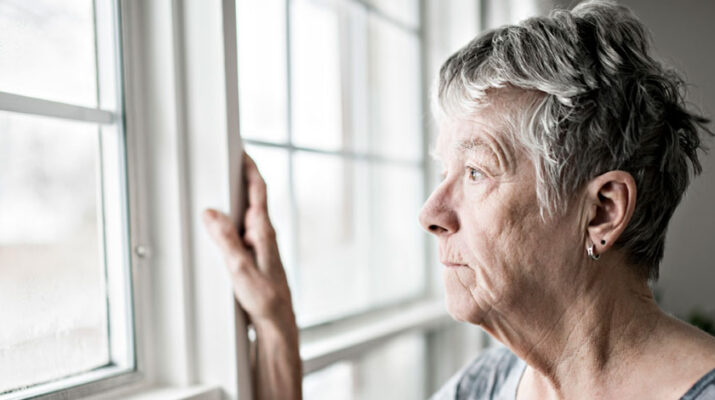Isolation has had negative impact on people living with cognitive impairment
By Deborah Jeanne Sergeant
Social isolation during the pandemic has brought a myriad of changes, from the inconsequential to the life-changing.
For people with Alzheimer’s disease or another form of dementia, isolation can have lasting negative effects.
Kathleen O’Brien, a nurse practitioner retired from University of Rochester, has years of experience in caring for dementia patients. A resident of Bristol with her husband, Graham Thompson, O’Brien has early-onset dementia. She is 68.
Since caring for patients with dementia was her specialty as a nurse, she realized it long before it was diagnosed. O’Brien considers herself lucky to have husband Thompson with her, despite struggles with getting items they need.
“Isolation increases the progression considerably early,” she said. “It steps up the pace. The social isolation can cause bad depression and that’s not good with dementia. For people living alone with dementia and aides coming and going, this is a terrible time for them.”
Although most healthy people can go places even during quarantine, most people with Alzheimer’s or another form of dementia are likely elderly or, like O’Brien, have health issues beyond her frontal temporal dementia that place them at higher risk. Many have both age and comorbidities against them.
For those at a more advanced stage of the disease, it may be difficult to understand why their schedule has been disrupted, relatives aren’t coming to visit or they can’t go places they would like to go.
“For families who have loved ones in assisted living or a nursing home, the visiting lockdown has been horrible,” said Marla Bruns, cognitive neurologist with Rochester Regional Health. “People do not remember what they’ve seen on the news. They don’t understand why they have to wear a mask.”
It’s also challenging for those with hearing impairment to understand caregivers who are wearing masks as their voices sound muffled and their lips and expressions are concealed.
Limiting interaction with people outside the household has also limited the possibilities for respite care, such as a caregiver helping out or taking the person to an adult day program. This can lead to caregiver burnout and less stimulation for the patients.
When Bruns has tested patients’ memory scores from before the pandemic to now, she says she noticed a decline. “There are noticeable declines. I can’t attribute that to the progression of disease. There are environmental factors. Even if they’re at home, they’re out of their routine. They can’t participate and take walks any time they feel like it. Feeling tethered is causing anxiety and aggravating behaviors that come with dementia later in the process.”
In some cases, it can be challenging to delineate between decline and the emotional effects of the isolation.
“Access to medical care is very difficult,” said physician David Gill, affiliated with Rochester Regional Health. “We try to do it with telemedicine. Most of the time, I don’t see anyone under 90. Even their children in their 70s don’t have access to technology.”
Like Bruns, Gill has seen many cases of cognitive decline and negative effects on mood among dementia patients because of COVID-19.
“The isolation has caused a direct decline,” Gill said. “It’s made apparent how important social interaction is. Studies show interaction can slow decline. Lack of it causes decline.”
While he believes that telehealth cannot take the place of in-person visits for these patients, he said it does allow providers to see a patient’s home, which can be helpful at times, as it shows the day-to-day difficulties a patient faces.
“Sometimes, the house is clearly unsafe or someone else is in the home and it’s quite stressful,” Gill said. “From a provider’s standpoint, it’s been a challenge which makes it harder to provide care. It’s a struggle for everyone at every level. It shows us how the impact on the most vulnerable is so all-encompassing.”
Physician Anafidelia Tavares is the state-wide research liaison for the Alzheimer’s Association. She said that discussing neurological issues over the phone is difficult. In addition to its regular assistance, the organization’s 24-hour helpline (800-272-3900) has been offering families support in navigating telehealth, such as ideas on what to ask doctors over the phone and ways to discuss their own or their loved one’s mental health.
“We’ve been working with health systems with how they might respond with their loved one’s COVID risk,” Tavares added.
The association is also helping people who have never used telehealth with tasks like logging onto Zoom or engaging in conference calls.
“For the caregivers who are struggling in the pandemic, we are here for them,” Tavarez said. “Alzheimer’s disease doesn’t have to be a lonely journey. We have all these free, virtual services. Our helpline is available with well-trained staff and social workers to respond to whatever your needs are. We have emotional support groups and they share strategies that work for them.”
She encourages caregivers to establish a new routine during the pandemic to help create a safe sense of normalcy for their loved one.
For O’Brien, hearing from her family and friends helps her feel better connected. She also tries to keep busy with gardening and swimming. By filling up her days with activities like this, it helps her pass the time without feeling overwhelmed.
“It helps me keep my spirits up,” she said. “I’m extremely busy every day.”

